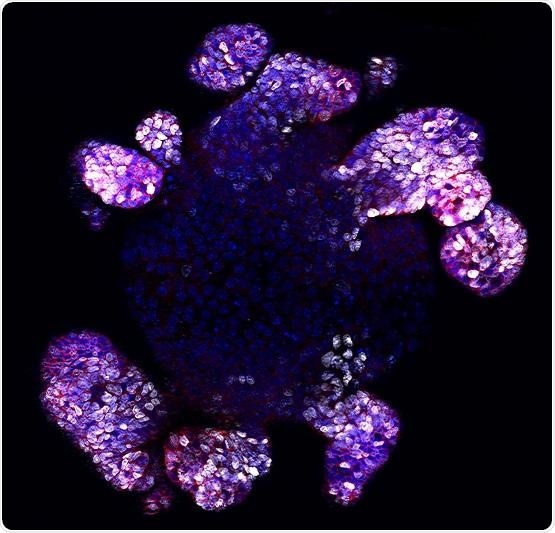For the first time, Monash University scientists have discovered a crucial biomolecule that improves the repair of a person’s gut lining by encouraging stem cells to regenerate impaired tissues.

Fluorescent picture of an intestinal organoid (stained for the proliferation marker Ki-67 (white), the stem cell marker Ephb2 (red), and DNA (blue). Image Credit: (C) Monash Biomedicine Discovery Institute.
A powerful cellular lining is critical for a healthy gut because it serves as a barrier to an unlimited number of dangerous toxins and microorganisms found in humans’ intestinal tract. Such a barrier is often impaired by inflammation and infection, leading to several painful symptoms.
Published in the Cell Stem Cell journal, the study explored the environment surrounding gut stem cells and employed “mini gut” organoid method, in which small replicas of gut tissue were cultured in a dish.
The study also defined major cells that exist in the vicinity of stem cells in the gut. These cells synthesize the biomolecule—known as Neuregulin-1—that directly acts on stem cells to launch the repair process.
The study was headed by Professor Helen Abud and Dr Thierry Jardé from Monash Biomedicine Discovery Institute.
Our really important discovery is that supplementation with additional Neuregulin-1 accelerates repair of the gut lining by activation of key growth pathways. Our findings open new avenues for the development of Neuregulin 1-based therapies for enhancing intestinal repair and supporting rapid restoration of the critical gut function.”
Helen Abud, Professor, Department of Anatomy and Developmental Biology, Monash Biomedicine Discovery Institute
Gastrointestinal disorders, like ulcerative colitis and Crohn’s disease, are serious health problems around the world and cause severe damage to the epithelial cell layer that lines the gut.
Under such conditions, the intestine has reduced ability to efficiently repair to restore its key absorptive function, and is linked to symptoms like malnutrition, weight loss, dehydration, and diarrhea. Hence, designing new methods to support the repair of intestinal tissue will considerably enhance patient recovery.
It was very exciting to observe that Neuregulin 1 can not only drive cells to divide but enhances stem cell properties which supercharges these cells into a repair program.”
Dr Thierry Jardé, Department of Anatomy and Developmental Biology, Monash Biomedicine Discovery Institute
“This shortens the period of damage. The gut lining is injured during common chemotherapy treatment for cancer and we were also able to show recovery is significantly improved with application of Neuregulin-1 following chemotherapy,” Jardé concluded.
Source:
Journal reference:
Jarde, T., et al. (2020) Mesenchymal Niche-Derived Neuregulin-1 Drives Intestinal Stem Cell Proliferation and Regeneration of Damaged Epithelium. Cell Stem Cell. doi.org/10.1016/j.stem.2020.06.021.